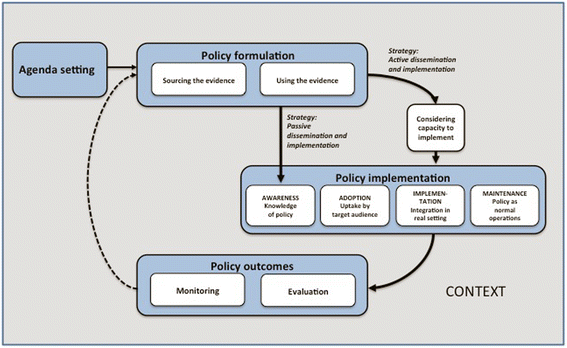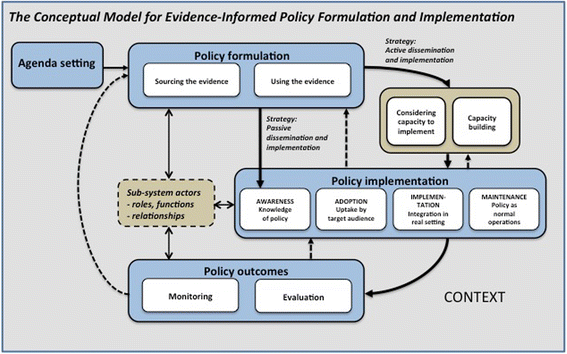Evidence-informed policy formulation and implementation: a comparative case study of two national policies for improving health and social care in Sweden
- PMID: 26642783
- PMCID: PMC4672562
- DOI: 10.1186/s13012-015-0359-1
Evidence-informed policy formulation and implementation: a comparative case study of two national policies for improving health and social care in Sweden
Abstract
Background: Evidence has come to play a central role in health policymaking. However, policymakers tend to use other types of information besides research evidence. Most prior studies on evidence-informed policy have focused on the policy formulation phase without a systematic analysis of its implementation. It has been suggested that in order to fully understand the policy process, the analysis should include both policy formulation and implementation. The purpose of the study was to explore and compare two policies aiming to improve health and social care in Sweden and to empirically test a new conceptual model for evidence-informed policy formulation and implementation.
Methods: Two concurrent national policies were studied during the entire policy process using a longitudinal, comparative case study approach. Data was collected through interviews, observations, and documents. A Conceptual Model for Evidence-Informed Policy Formulation and Implementation was developed based on prior frameworks for evidence-informed policymaking and policy dissemination and implementation. The conceptual model was used to organize and analyze the data.
Results: The policies differed regarding the use of evidence in the policy formulation and the extent to which the policy formulation and implementation phases overlapped. Similarities between the cases were an emphasis on capacity assessment, modified activities based on the assessment, and a highly active implementation approach relying on networks of stakeholders. The Conceptual Model for Evidence-Informed Policy Formulation and Implementation was empirically useful to organize the data.
Conclusions: The policy actors' roles and functions were found to have a great influence on the choices of strategies and collaborators in all policy phases. The Conceptual Model for Evidence-Informed Policy Formulation and Implementation was found to be useful. However, it provided insufficient guidance for analyzing actors involved in the policy process, capacity-building strategies, and overlapping policy phases. A revised version of the model that includes these aspects is suggested.
Figures
Similar articles
-
Analysing key influences over actors' use of evidence in developing policies and strategies in Nigeria: a retrospective study of the Integrated Maternal Newborn and Child Health strategy.Health Res Policy Syst. 2016 Apr 12;14:27. doi: 10.1186/s12961-016-0098-z. Health Res Policy Syst. 2016. PMID: 27067540 Free PMC article.
-
Implementation of a national policy for improving health and social care: a comparative case study using the Consolidated Framework for Implementation Research.BMC Health Serv Res. 2019 Oct 22;19(1):730. doi: 10.1186/s12913-019-4591-2. BMC Health Serv Res. 2019. PMID: 31640680 Free PMC article.
-
Enhancing evidence informed policymaking in complex health systems: lessons from multi-site collaborative approaches.Health Res Policy Syst. 2016 Mar 17;14:20. doi: 10.1186/s12961-016-0089-0. Health Res Policy Syst. 2016. PMID: 26983405 Free PMC article.
-
Avoiding and identifying errors in health technology assessment models: qualitative study and methodological review.Health Technol Assess. 2010 May;14(25):iii-iv, ix-xii, 1-107. doi: 10.3310/hta14250. Health Technol Assess. 2010. PMID: 20501062 Review.
-
Investigating the process of evidence-informed health policymaking in Bangladesh: a systematic review.Health Policy Plan. 2019 Jul 1;34(6):469-478. doi: 10.1093/heapol/czz044. Health Policy Plan. 2019. PMID: 31237941 Free PMC article.
Cited by
-
A grounded theory-based qualitative approach for examining local implementation of public health policies during crises.MethodsX. 2023 Oct 24;11:102439. doi: 10.1016/j.mex.2023.102439. eCollection 2023 Dec. MethodsX. 2023. PMID: 38023318 Free PMC article.
-
One size fits none - a qualitative study investigating nine national quality registries' conditions for use in quality improvement, research and interaction with patients.BMC Health Serv Res. 2018 Oct 20;18(1):802. doi: 10.1186/s12913-018-3621-9. BMC Health Serv Res. 2018. PMID: 30342511 Free PMC article.
-
Promoting evidence informed policy making in Nigeria: a review of the maternal, newborn and child health policy development process.Health Promot Perspect. 2017 Sep 26;7(4):181-189. doi: 10.15171/hpp.2017.33. eCollection 2017. Health Promot Perspect. 2017. PMID: 29085794 Free PMC article. Review.
-
Developing and implementing National Health Insurance: learnings from the first try in Benin.BMJ Glob Health. 2022 Nov;7(11):e009027. doi: 10.1136/bmjgh-2022-009027. BMJ Glob Health. 2022. PMID: 36410785 Free PMC article.
-
From bench to policy: a critical analysis of models for evidence-informed policymaking in healthcare.Front Public Health. 2024 Mar 26;12:1264315. doi: 10.3389/fpubh.2024.1264315. eCollection 2024. Front Public Health. 2024. PMID: 38596514 Free PMC article. Review.
References
-
- Nutley SM, Davies HTO, Smith PC, editors. What works?: evidence-based policy and practice in public services. Bristol: The Policy Press; 2000.
-
- Head BW. Reconsidering evidence-based policy: key issues and challenges. Polic Soc. 2010;29:77–94. doi: 10.1016/j.polsoc.2010.03.001. - DOI
Publication types
MeSH terms
LinkOut - more resources
Full Text Sources
Other Literature Sources
Medical



